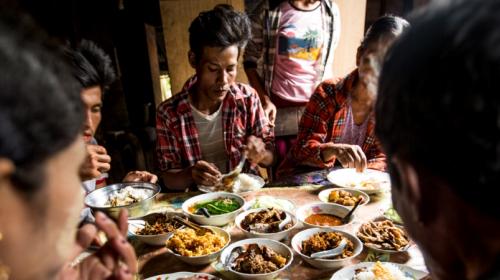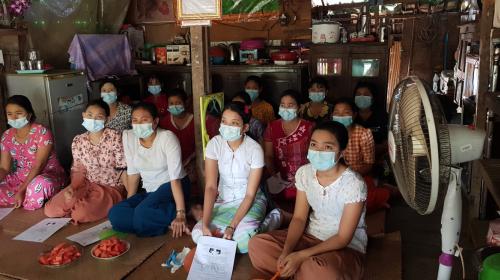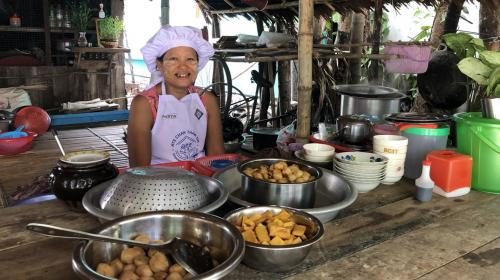
(Myanmar language below)
In the wake of Myanmar’s military coup on February 1, 2021, the UNOPS-managed Livelihoods and Food Security Fund (LIFT) signals a warning about the rapidly deteriorating food and nutrition security of thousands of migrant workers and their children in impoverished peri-urban Yangon. As the political crisis continues to unfold, families, who were already surviving on the edge prior to the COVID-19 outbreak, are now living in growing insecurity, facing the complete loss of or reduced income, limited access to food amidst skyrocketing food prices and barriers to accessing health services. The threat of an emerging nutrition and health crisis in peri-urban Yangon is real as thousands of people, women and children in particular, can no longer meet their basic food and healthcare needs.
Even before the arrival of COVID-19, only 40 per cent of the Myanmar population could afford a diet that met their nutrient needs.[1] In some pockets of the country, including peri-urban Yangon, the nutrition context before 2020 reflected particular vulnerability including a high rate of child wasting (9.3%), stunting (28.8%) and maternal underweight (13.7%) while the coverage of essential nutrition and health services was low in Yangon’s informal settlements. The onset of the COVID-19 pandemic has dramatically worsened the nutrition situation with estimations suggesting an additional 110,000 children under-five have become wasted. The ongoing political crisis will certainly trigger a further stark increase in hunger and child malnutrition, particularly among a growing number of vulnerable households in peri-urban townships.
Access to food is becoming harder
The widespread closure of markets, shops and grocery stores has limited access to food, especially for the most vulnerable families. Where food is available, prices are rising, particularly for staple foods such as rice, oil and fuel which have already gone up on average by 10-15 per cent and continue rising, intensifying the food insecurity of the poorest families. Many families struggle to afford basic foodstuffs, let alone all those other food products that make up a diverse, nutrient-dense diet. This puts nutritionally vulnerable groups, particularly young children, adolescents and women of reproductive age at greater risk of undernutrition.
A mother of a six-day old infant in Shwe Pyi Tar said, “I really want to have meat sometimes, but it is not affordable for me.”
Loss of income is widespread
At the same time, workers in peri-urban Yangon are facing significantly reduced income.“None of my family members has a job now. My husband used to drive a sand truck before... We are not financially secure at the moment,” said a mother of a fifteen-month-old in Shwe Pyi Tar.
Many of the factories that sustain peri-urban families have shut down due to reduced orders and supply chain issues; while others face significant cash flow issues. This has led to significant numbers of workers (primarily migrant women) losing their employment altogether with many factories refusing, or unable, to pay outstanding wages.
Facing food shortages, loss of work, and increasing violence, many of the migrants previously employed in the industrial sector have left Yangon, affecting incomes of many smallholder urban vendors. For those who remain, there are further challenges to livelihoods as many are facing debt or have had their assets destroyed. For those who have managed to save money in bank accounts or who are reliant on social protection schemes, there are challenges in accessing cash, as most bank branches are closed. Khin is the head of a twelve person household (with 9 adults and 3 children), which relies on the salary of two adults. She said that although they can purchase food now, they cannot access their money, as banks are closed and ATMs are not reliable.
Reductions in income coupled with movement restrictions further hinder people’s access to healthcare, medicine and other basic needs.
Nutrition and health services are at standstill
In many parts of the city, health facilities are either not functioning or performing at reduced capacity. Difficulties crossing townships mean that health professionals cannot reach patients; this is a particular problem for midwives unable to provide safe and sanitary conditions for pregnant women to deliver their babies and HIV-positive individuals who face challenges accessing HIV services and antiretroviral medication. Even where facilities do function, lack of or reduced resources, military occupation of public hospitals, and restrictions in movement lead to limited or lack of access to routine and emergency nutrition and health services including pre and postnatal care, treatment of malnutrition, breastfeeding counseling, and immunizations, among other services.
A mother of a six-month-old child reported that, “due to the political situation, we are afraid to go to clinics and hospitals now.”
Rise in violence against women
With many peri-urban townships under martial law, communities are facing aggression and random acts of violence on the streets, at workplaces, and increasingly in their homes. Women garment workers have taken a predominant position in demonstrations against the military. In addition to facing the violent crackdown of such demonstrations, there is an increase in incidents of gender-based violence and sexual harassment, which poses another threat to women and children’s nutrition security.
Insecurity is causing spikes in psychosocial stress
Escalating violence affects women’s health and caregiving capacity. Moreover, children’s mental health and wellbeing is a major concern, as children have now been out of school for one year and are surrounded by an increasingly insecure context.
A young mother in Yangon’s industrial zone said, “I feel depressed due to shortage of money. Adults are scared and my baby cries all the time because of the noise at night.”
Coordinated nutrition response is required for peri-urban Yangon
To prevent the sharp increase in hunger and malnutrition, the Livelihoods and Food Security Fund (LIFT) is engaging with partners to scope out immediate needs and respond in close coordination with the Access to Health Fund and the Humanitarian Assistance and Resilience Programme Facility (HARP-F). Partners are mobilising to support a series of social protection interventions such as in-kind transfers, vouchers and/or cash transfers, nutrition counseling, breastfeeding support and treatment of severe acute malnutrition in the absence of functional public services. Response will also focus on ensuring widespread access to safe water and sanitation services and facilities to safeguard health and nutrition. Wherever possible, Social Behaviour Change Communication will continue to support the adoption of positive nutrition, health and hygiene behaviours. This will be combined with legal counseling, psychosocial support and child protection interventions, such as counseling services to women, children, youth and others who have been exposed to physical or emotional trauma. Where available, shelter accomodation will also be offered to the most vulnerable.
[1] WFP. (2019). Fill the Nutrient Gap Survey
အသက်မွေးဝမ်းကျောင်း ဆုံးရှုံးမှုများ ကြုံတွေ့ရသဖြင့် စားနပ်ရိက္ခာနှင့် အာဟာရဖွံ့ဖြိုးမှု အကျပ်အတည်း ဖြစ်ရန် နီးကပ်လာနေပြီဖြစ်သည့် ရန်ကုန်မြို့ပြဝန်းကျင်
၂၀၂၁ ခုနှစ် ဖေဖော်ဝါရီလ ၁ ရက်နေ့တွင် မြန်မာ စစ်တပ်မှ အာဏာသိမ်းလိုက်သဖြင့် ရန်ကုန် မြို့ပြဝန်းကျင်ဒေသနေ ဆင်းရဲ နွမ်းပါးသည့် ထောင်ပေါင်း များစွာသော ရွှေ့ပြောင်း အလုပ်သမားများနှင့် ၎င်းတို့၏ ကလေးငယ်များ၏ စားနပ်ရိက္ခာဖူလုံမှုနှင့် အာဟာရဖွံ့ဖြိုးမှုတို့မှာ လျင်မြန်စွာ ဆိုးရွားနိမ့်ကျလာလျက်ရှိကြောင်းကို UNOPS မှ စီမံခန့်ခွဲသည့် အသက်မွေးဝမ်းကျောင်းမှုနှင့် စားနပ်ရိက္ခာ ဖူလုံရေး ရန်ပုံငွေ (LIFT) မှ သတိပေးပြောကြားလိုက်ပါသည်။ ယခုအခါတွင် နိုင်ငံရေး အကျပ်အတည်း ဆက်လက် အရှိန်မြင့်တက်လာသည်နှင့်အမျှ COVID-19 ကပ်ရောဂါ ဖြစ်ပွားမှုကြောင့် ယိုင်နဲ့နေသည့် အခြေအနေတွင် ရှင်သန်နေထိုင်နိုင်ရန် ခက်ခက်ခဲခဲ ကြိုးပမ်းနေကြရသည့် မိသားစုများသည် တစ်စထက်တစ်စဆိုးရွားသည့် လုံခြုံမှုမရှိသော အခြေအနေတွင် နေထိုင်နေကြရခြင်း၊ ဝင်ငွေ ကျဆင်းမှု (သို့) ဝင်ငွေ ဆုံးရှုံးမှုတို့ကို ရင်ဆိုင်နေကြရခြင်း၊ စားသောက်ကုန်ဈေးနှုန်းများ အဆမတန် မြင့်တက်လာသည့် အကျပ်အတည်းများကြားတွင် စားနပ်ရိက္ခာ ဖူလုံမှုမရှိခြင်း နှင့် ကျန်းမာရေး ဝန်ဆောင်မှုများ ရရှိရန် ခက်ခဲနေခြင်းတို့ကို ရင်ဆိုင်နေကြရပါသည်။ အထူးသဖြင့် အမျိုးသမီးများနှင့် ကလေးသူငယ်များအပါအဝင် ထောင်ပေါင်း များစွာ သော ပြည်သူတို့ အနေဖြင့် အခြေခံ စားနပ်ရိက္ခာနှင့် ကျန်းမာရေး စောင့်ရှောက်မှုဆိုင်ရာ လိုအပ်ချက်များ မရရှိနိုင်တော့သဖြင့် ရန်ကုန် မြို့ပြဝန်းကျင်ဒေသတွင် အာဟာရဖွံ့ဖြိုးမှုနှင့် ကျန်းမာရေး ဆိုင်ရာအကျပ်အတည်းများ ဖြစ်ပေါ်လာတော့မည့် ခြိမ်းခြောက်မှု အန္တရာယ်မှာ မလွဲဧကန်ပင် ဖြစ်ပါသည်။
COVID-19 ကပ်ရောဂါ မဖြစ်ပွားမီကတည်းကပင် မြန်မာနိုင်ငံတွင် လူဦးရေ၏ ၄၀ ရာခိုင်နှုန်းကသာ အာဟာရဖွံ့ဖြိုးမှုဆိုင်ရာ လိုအပ်ချက် ပြည့်မီအောင် စားသုံးနိုင်ကြပါသည်။ ရန်ကုန် မြို့ပြဝန်းကျင်ဒေသ အပါအဝင် နိုင်ငံအတွင်းရှိ နေရာအချို့တွင် ၂၀၂၀ခုနှစ်မတိုင်မီ အာဟာရဖွံ့ဖြိုးမှု အခြေအနေမှာ အထူးသဖြင့် ကလေးသူငယ် ကျုံလှီမှုနှုန်း (၉.၃%) ပုညှက်မှုနှုန်း (၂၈.၈%) နှင့် မိခင်လောင်း ကိုယ်အလေးချိန် မပြည့်မီမှုနှုန်း (၁၃.၇%) အထိ မြင့်တက်ခဲ့ခြင်း အပါအဝင် အားနည်းထိခိုက်လွယ်မှု ကို ထင်ဟပ်ခဲ့ပြီး ရန်ကုန်ရှိ ကျူးကျော်ရပ်ကွက်များတွင် မရှိမဖြစ် လိုအပ်သည့် အာဟာရ ဖွံ့ဖြိုးမှုနှင့် ကျန်းမာရေး ဝန်ဆောင်မှု လွှမ်းခြုံနိုင်မှုမှာလည်း နိမ့်ကျလျက် ရှိပါသည်။ COVID-19 ကမ္ဘာ့ကပ်ရောဂါ ဖြစ်ပွား မှုကြောင့် အာဟာရ ဖွံ့ဖြိုးမှု အခြေအနေမှာ ဆိုးဆိုးရွားရွား ယုတ်လျော့ သွားခဲ့ပြီး နောက်ထပ် အသက်ငါးနှစ်အောက် ကလေးသူငယ် ၁၁၀,၀၀၀ခန့်မှာ ကျုံလှီမှုကို ခံစားရနိုင်ချေ ရှိမည် ဟု ခန့်မှန်း ထားပါသည်။ ဖြစ်ပွားနေသည့် နိုင်ငံရေး အကျပ်အတည်းကြောင့် အထူးသဖြင့် မြို့ပြ ဝန်းကျင်ဒေသရှိ မြို့နယ်များတွင် တိုးတက် များပြားလာလျက်ရှိသည့် အားနည်းထိခိုက်လွယ် အိမ်ထောင်စုများကြားတွင် ငတ်မွတ်မှုနှင့် ကလေးသူငယ် အာဟာရ ချို့တဲ့မှုတို့ အား ထပ်မံ၍ သိသိသာသာ ဆိုးရွား လာမည် ဆိုသည်မှာ ယုံမှားဖွယ်မရှိပါ။
စားနပ်ရိက္ခာ လက်လှမ်းမီ ရရှိနိုင်မှု ပိုမို ခက်ခဲလာခြင်း
ဈေးများ၊ ဆိုင်များ နှင့် ကုန်စုံဆိုင်များ အများအပြား ပိတ်ခြင်းကြောင့် အထူးသဖြင့် အားနည်း ထိခိုက်လွယ်မှု အများဆုံး မိသားစု များအတွက် အစားအစာ လက်လှမ်းမီရရှိမှုအား အကန့်အသတ် ဖြစ်စေခဲ့ပါသည်။ စားနပ်ရိက္ခာများ ရရှိနိုင်သည့် နေရာများတွင်မူ ကုန်ဈေးနှုန်းများ မြင့်တက်နေပြီး အထူးသဖြင့် ဆန်၊ဆီ နှင့် လောင်စာဆီကဲ့သို့သော အဓိက စားသောက်ကုန်များမှာ ပျမ်းမျှ ၁၀ ရာခိုင်နှုန်းမှ ၁၅ ရာခိုင်နှုန်းအထိ မြင့်တက်နေပြီး ဖြစ်သည့်အပြင် ဆက်လက်၍လည်း ဈေးနှုန်းမြင့်တက်လျက်ရှိရာ ဆင်းရဲနွမ်းပါးမှု အဆိုးရွားဆုံးသော မိသားစုများ ၏ စားနပ်ရိက္ခာ မဖူလုံမှုကို ပိုမိုဆိုးရွားစေပါသည်။ မိသားစုအများအပြားမှာ အမည်စုံအာဟာရရှိစေမည့် အခြားစားသောက်ကုန်များကို မဆိုထားနှင့် အခြေခံ စားသောက်ကုန်များကို ဝယ်ယူရန်ပင် ခက်ခက်ခဲခဲ ရုန်းကန်နေကြရပါသည်။ ယင်းအခြေအနေကြောင့် အာဟာရ ဖွံ့ဖြိုးမှုဆိုင်ရာတွင် အားနည်းထိခိုက်လွယ်သည့် အုပ်စုများ အထူးသဖြင့် ငယ်ရွယ်သည့် ကလေးသူငယ်များ၊ ဆယ်ကျော်သက်များ နှင့် မျိုးဆက်ပွားနိုင်သည့် အသက်အရွယ် အတွင်းရှိသော အမျိုးသမီးများအတွက် ကြီးမားသည့် အာဟာရ ချို့တဲ့မှု အန္တရာယ် ရှိပါသည်။
ရွှေပြည်သာမြို့နယ်မှ အသက် ၆ ရက်အရွယ် မွေးကင်းစ ကလေးငယ်၏ မိခင်က “တခါတလေ ကျွန်မ အသား စားချင်စိတ် ဖြစ်မိတာ အမှန်ပါ၊ ဒါပေမဲ့ ကျွန်မ အသားဝယ်စားဖို့ မတတ်နိုင်ဘူး” ဟု ပြောပါသည်။
ဝင်ငွေ ဆုံးရှုံးမှုများ အများအပြား ဖြစ်နေခြင်း
တချိန်တည်းမှာပင် ရန်ကုန် မြို့ပြဝန်းကျင် ဒေသရှိ အလုပ်သမားအများအပြားမှာ ဝင်ငွေ လျော့ကျမှုနှင့် ရင်ဆိုင်နေကြရပါသည်။ “အခု အချိန် ကျွန်မတို့ မိသားစု မှာ ဘယ်သူမှ အလုပ်မရှိဘူး။ ကျွန်မ ယောကျာ်းက အရင်က သဲကားမောင်းပါတယ်. အခုတော့ ကျွန်မတို့ ငွေရေးကြေးရေး မပြေလည်တော့ဘူး” ဟု ရွှေပြည်သာမြို့နယ်နေ ၁၅လသားကလေးငယ် ၏ မိခင်က ပြောပါသည်။
မြို့ပြဝန်းကျင် ဒေသနေ မိသားစုများအား ရှင်သန် ရပ်တည်နိုင်စေခဲ့သည့် စက်ရုံအများအပြားမှာ အမှာစာများ လျော့ကျခြင်းနှင့် ကုန်စည်စီးဆင်းမှု ကွင်းဆက် ပြဿနာများကြောင့် ပိတ်သိမ်းခဲ့ကြပြီး အချို့စက်ရုံများမှာလည်း ငွေကြေးလည်ပတ်မှုဆိုင်ရာ ပြဿနာများအား ကြီးကြီးမားမား ကြုံတွေ့နေကြရပါသည်။ အဆိုပါ ဖြစ်ရပ်များကြောင့် အလုပ်သမားအများအပြား (အဓိက အားဖြင့် အမျိုးသမီး ရွှေ့ပြောင်း လုပ်သား အများအပြား) အား အလုပ်လက်မဲ့ ဖြစ်စေခဲ့ပြီး စက်ရုံအများအပြားမှ ပေးရန်ကျန်ရှိ နေသည့် လုပ်ခလစာများ ပေးချေရန် ငြင်းဆိုခြင်း (သို့) မပေးနိုင်တော့ခြင်းတို့ကိုပါ ရင်ဆိုင်နေကြရပါသည်။
စားနပ်ရိက္ခာ ပြတ်လပ်ခြင်း၊ အလုပ်လက်မဲ့ ဖြစ်ခြင်း နှင့် အကြမ်းဖက်မှုများ ပို၍ များပြားလာခြင်းတို့ကို ကြုံတွေ့ရသဖြင့် ယခင်က စက်မှု ကဏ္ဍတွင် အလုပ်အကိုင် ရရှိခဲ့ကြသည့် ရွှေ့ပြောင်းလုပ်သား အများအပြား ရန်ကုန်မြို့ကို စွန့်ခွာခဲ့ကြရာ မြို့ပြရှိ ပျံကျ ဈေးသည် အများအပြား၏ ဝင်ငွေကို ထိခိုက်စေပါသည်။ ရန်ကုန်မြို့တွင် ဆက်လက်နေထိုင်သူ အများအပြား အနေဖြင့်လည်း အကြွေးတင်ခြင်း (သို့) ပိုင်ဆိုင်မှုများ ဖျက်ဆီးခံကြရခြင်းတို့ကြောင့် အသက်မွေးမှုအတွက် စိန်ခေါ်မှုများ ထပ်မံရင်ဆိုင်ကြုံတွေ့ နေကြရပါသည်။ ဘဏ်စာရင်းများဖွင့်၍ ငွေစုဆောင်းနိုင်သူများ (သို့) လူမှုဖူလုံရေး အစီအစဉ်များအပေါ် မှီခိုနေသူများမှာလည်း ဘဏ်ခွဲ အများအပြား ပိတ်ထားခြင်းကြောင့် ငွေထုတ်ယူရာတွင် စိန်ခေါ်မှုများ ရင်ဆိုင်နေကြရပါသည်။ ခင် သည် အရွယ်ရောက်ပြီးသူ နှစ်ဦး၏ လစာအပေါ်တွင် မှီခိုနေရသော မိသားစုဝင် ဆယ့်နှစ်ဦး ရှိသည့် အိမ်ထောင်စု (လူကြီး ၉ ယောက် နှင့် ကလေး ၃ ယောက်) ၏ အိမ်ထောင်ဦးစီး ဖြစ်ပါသည်။ သူမက လက်ရှိတွင် မိသားစုအနေဖြင့် အစားအသောက်များ ဝယ်ယူနိုင်သော်လည်း ဘဏ်များ ပိတ်ထားပြီး အလိုအလျောက် ငွေထုတ်စက် (ATM)များမှာ ငွေထုတ်ယူနိုင်ရန် မသေချာခြင်းတို့ကြောင့် ၎င်းတို့အနေဖြင့် ငွေထုတ်ယူ နိုင်ခြင်း မရှိပါဟု ပြောပါသည်။
ဝင်ငွေလျော့ကျသည့်အပြင် အသွားအလာများ ကန့်သတ်ထားခြင်းကြောင့် ပြည်သူတို့ အနေဖြင့် ကျန်းမာရေး စောင့်ရှောက်မှု၊ ဆေးဝါး နှင့် အခြား အခြေခံ လိုအပ်ချက်များအား လက်လှမ်းမီ ရယူနိုင်ရန် ထပ်ဆင့်၍ အဟန့်အတား ဖြစ်စေပါသည်။
အာဟာရ ဖွံ့ဖြိုးရေးနှင့် ကျန်းမာရေး ဆိုင်ရာ ဝန်ဆောင်မှုများ ရပ်တန့်နေခြင်း
ရန်ကုန်မြို့ နေရာ အများအပြား၌ ကျန်းမာရေး စောင့်ရှောက်မှုပေးသည့် ဌာနများမှာ လုပ်ငန်းလုပ်ဆောင်နိုင်မှု လုံးဝ မရှိခြင်း (သို့) ဝန်ထမ်းအင်အား လျော့နည်းနေသဖြင့် ကောင်းစွာ ဆောင်ရွက်နိုင်မှု မရှိပါ။ တစ်မြို့နယ်နှင့် တစ်မြို့နယ် သွား ရောက် ရန် ခက်ခဲသဖြင့် ကျန်းမာရေး ဝန်ထမ်းများအနေဖြင့် လူနာများထံ သွားရောက်နိုင်မှု မရှိခြင်းကြောင့် အထူးသဖြင့် သားဖွားဆရာမ များ အနေဖြင့် ကိုယ်ဝန်ဆောင် အမျိုးသမီးများ ကလေးမွေးဖွားရာတွင် ဘေးကင်းစိတ်ချရပြီး သန့်ရှင်းစွာ စောင့်ရှောက် ပေးနိုင်သည့် အခြေအနေ ဖန်တီးပေးနိုင်မှု မရှိသည့် ပြဿနာနှင့် အိတ်ချ်အိုင်ဗွီ ရောဂါပိုး ရှိသူများအနေဖြင့် အိတ်ချ်အိုင်ဗွီ ရောဂါဆိုင်ရာ ဝန်ဆောင်မှုများနှင့် အေအာရ်တီဆေး ရရှိနိုင်ရန် စိန်ခေါ်မှုများ ကြုံတွေ့ရခြင်းတို့ ဖြစ်စေပါသည်။ ကျန်းမာရေး စောင့်ရှောက်မှု ပေးသည့် ဌာနများမှာ လုပ်ငန်း ဆောင်ရွက်နိုင်သော်လည်း ရင်းမြစ်များ မရှိခြင်း (သို့) လျော့နည်းခြင်း၊ ပြည်သူ့ ဆေးရုံများတွင် စစ်တပ်မှ တပ်စွဲထားခြင်း နှင့် အသွားအလာ ထိန်းချုပ်ထားခြင်းတို့ကြောင့် အခြားကျန်းမာရေးဝန်ဆောင်မှုများ အနက်မှ ကိုယ်ဝန်ဆောင်နှင့် မွေး လူနာ စောင့်ရှောက်ခြင်း၊ အာဟာရ မပြည့်ဝခြင်း အတွက် ကုသမှုပေးခြင်း၊ မိခင်နို့တိုက်ကျွေးရန် နှစ်သိမ့် ဆွေးနွေးခြင်း နှင့် ကာကွယ်ဆေးထိုးခြင်း အပါအဝင် ပုံမှန် နှင့် အရေးပေါ် အာဟာရ ဖွံ့ဖြိုးမှု နှင့် ကျန်းမာရေးဆိုင်ရာ ဝန်ဆောင်မှု များအား လက်လှမ်းမီ ရရှိမှုတွင် အကန့်အသတ်ရှိခြင်းနှင့် လုံးဝမရှိခြင်းဆီသို့ ဦးတည်စေခဲ့ပါသည်။
အသက် ခြောက်လ အရွယ် ကလေးငယ်၏ မိခင်က “နိုင်ငံရေး အခြေအနေတွေကြောင့် အခုအချိန်မှာ ဆေးရုံဆေးခန်းသွားရမှာ ကြောက်နေရပါတယ်” ဟု ပြောပါသည်။
အမျိုးသမီးများအပေါ် အကြမ်းဖက်မှုများ မြင့်တက်လာခြင်း
မြို့ပြဝန်းကျင်ရှိ မြို့နယ်အများအပြားတွင် စစ်အုပ်ချုပ်ရေး ကြေညာထားသဖြင့် မြို့နေလူထုမှာ လမ်းများ၊ လုပ်ငန်းခွင်များ နှင့် ၎င်းတို့၏ နေအိမ်များတွင် တစ်စထက်တစ်စ ပို၍ ရန်မူခံရခြင်း နှင့် ပရမ်းပတာ အကြမ်းဖက်ခံရခြင်း တို့ကို ရင်ဆိုင်နေကြရပါသည်။ စစ်တပ်ကို ဆန့်ကျင်သည့် ဆန္ဒ ပြပွဲများတွင် အမျိုးသမီး အထည်ချုပ် လုပ်သားများ သည် အဓိက အခန်းကဏ္ဍမှ ပါဝင်ခဲ့ကြပါသည်။ အဆိုပါ ဆန္ဒပြပွဲများအား အကြမ်းဖက် ဖြိုခွင်းမှုကို ရင်ဆိုင်ရသည့် အပြင် ကျား-မ အခြေပြု အကြမ်းဖက်မှု နှင့် လိင်ပိုင်းဆိုင်ရာ ထိပါးနှောင့်ယှက်မှုများ ပိုမို များပြားလာခြင်းတို့ကြောင့် အမျိုးသမီးများနှင့် ကလေးသူငယ်များ၏ အာဟာရဖူလုံမှု အတွက် နောက်ထပ် ခြိမ်းခြောက်မှု တစ်ရပ် ဖြစ်နေပါသည်။
လုံခြုံမှု မရှိခြင်းကြောင့် စိတ်လူမှုဆိုင်ရာ ဖိစီးမှုများ မြင့်တက်စေခြင်း
အရှိန်မြင့်တက်လာသည့် အကြမ်းဖက်မှုများကြောင့် အမျိုးသမီးများ၏ ကျန်းမာရေးနှင့် ပြုစုစောင့်ရှောက်မှုပေးနိုင်စွမ်းရည် ကို ထိခိုက်စေလျက် ရှိပါသည်။ ထို့ပြင် ယခုအခါ ကလေးသူငယ်များ အနေဖြင့် ကျောင်းမတက်ရသည်မှာ တစ်နှစ်ရှိပြီ ဖြစ်သည့်အပြင် ပို၍ ပို၍ မလုံခြုံသည့် အခြေအနေ တွင် ပိတ်မိနေကြသဖြင့် ကလေးသူငယ်များ ၏ စိတ်ကျန်းမာရေးနှင့် ကိုယ်စိတ်နှစ်ဖြာ ကျန်းမာ ချမ်းသာရေးမှာ အဓိက စိုးရိမ်ပူပန်ရမည့် အချက်ဖြစ်ပါသည်။
ရန်ကုန်မြို့ရှိ စက်မှုဇုန်မှ ငယ်ရွယ်သည့် မိခင်တစ်ဦးက “ငွေပြတ်နေလို့ ကျွန်မ စိတ်ဓာတ်ကျမိပါတယ်။ ညဖက်ကျရင် ဆူညံသံ တွေကြောင့် လူကြီးတွေက ကြောက်နေကြရပြီး ကျွန်မကလေးက တချိန်လုံး ငိုပါတယ်” ဟု ပြောပါသည်။
ရန်ကုန် မြို့ပြဝန်းကျင်အတွက် အာဟာရ ဖွံ့ဖြိုးမှုဆိုင်ရာ ပေါင်းစပ်ညှိနှိုင်းသည့် တုံ့ပြန်ဆောင်ရွက်မှု လိုအပ်နေခြင်း
ငတ်မွတ်ခေါင်းပါးမှုနှင့် အာဟာရ ချို့တဲ့မှု တို့ တဟုန်ထိုး များပြားလာခြင်းမှ တားဆီးကာကွယ်ရန် အသက်မွေးဝမ်းကျောင်းမှုနှင့် စားနပ်ရိက္ခာ ဖူလုံရေး ရန်ပုံငွေ (LIFT) သည် လတ်တလော လိုအပ်ချက်များအား လေ့လာဖော်ထုတ်ရန် နှင့် တုံ့ပြန်ဆောင်ရွက်ရန် တို့အတွက် ကျန်းမာရေး စောင့်ရှောက်မှု လက်လှမ်းမီ ရရှိရေး ရန်ပုံငွေ (Access to Health Fund) နှင့် လူသားချင်း စာနာ ထောက်ထားမှု အကူအညီ နှင့် ပြန်လည်ထူထောင်နိုင်စွမ်း ထောက်ပံ့မှု အစီအစဉ် (HARP-F) တို့နှင့် အနီးကပ် ပေါင်းစပ်ညှိနှိုင်း ၍ မိတ်ဖက်အဖွဲ့အစည်းများနှင့် လက်တွဲဆောင်ရွက်လျက် ရှိပါသည်။ မိတ်ဖက်အဖွဲ့အစည်းများအနေဖြင့် ပြည်သူ့ ဝန်ဆောင်မှု လုပ်ငန်းများ ဆောင်ရွက်နိုင်ခြင်း မရှိချိန်တွင် လိုအပ်သည့် ပစ္စည်းများ ပေးလှူခြင်း၊ ကူပွန်ဘောက်ချာများ နှင့်/(သို့) ငွေကြေး ပံ့ပိုးပေးခြင်း၊ အာဟာရဖွံ့ဖြိုးမှုဆိုင်ရာ ဆွေးနွေးပေးခြင်း၊ မိခင် နို့တိုက်ကျွေးရန် ကူညီပံ့ပိုးပေးခြင်း နှင့် လတ်တလော အာဟာရ ချို့တဲ့မှုအား ကုသပေးခြင်းတို့ကဲ့သို့သော လူမှုကာကွယ် စောင့်ရှောက်ရေး စီမံကိန်း လုပ်ငန်းစဉ် အများအပြားအား ထောက်ပံ့ပေးနိုင်ရန် စီစဉ်ဆောင်ရွက်လျက် ရှိပါသည်။ တုံ့ပြန်ဆောင်ရွက်မှုများတွင် ဘေးကင်းစိတ်ချရသည့် ရေ နှင့် ပတ်ဝန်းကျင် သန့်ရှင်းရေး ဆိုင်ရာ ဝန်ဆောင်မှုများနှင့် ကျန်းမာရေး နှင့် အာဟာရ ဖွံ့ဖြိုးမှု စောင့်ရှောက်ပေးနိုင်ရန် လိုအပ်သည့် အထောက်အပံ့ပစ္စည်းများ အား ကျယ်ကျယ်ပြန့်ပြန့် လက်လှမ်းမီ ရရှိစေရန်တို့အတွက် ကိုလည်း အလေးထား ဆောင်ရွက်သွားမည် ဖြစ်ပါသည်။ ဆောင်ရွက်နိုင်သည့် အခြေအနေရှိသည့် နေရာတိုင်းတွင် ကောင်းမွန်သည့် အာဟာရဖွံ့ဖြိုးမှု၊ ကျန်းမာရေးနှင့် တစ်ကိုယ်ရေ သန့်ရှင်းရေး ဆိုင်ရာ အမူအကျင့်များ အား ကျင့်သုံးနိုင်ရန်အတွက် ကူညီပံ့ပိုးပေးရန် အာဟာရနှင့် ကျန်းမာရေးဆိုင်ရာ အမူအကျင့် ပြောင်းလဲရေး အသိပညာပေးလုပ်ငန်း များအား ဆက်လက် ဆောင်ရွက်သွားမည် ဖြစ်ပါသည်။ ယင်းလုပ်ငန်းစဉ်အား ရုပ်ပိုင်း နှင့် စိတ်ပိုင်းဆိုင်ရာ ဒဏ်ရာ ရထားသည့် အမျိုးသမီးများ၊ ကလေးသူငယ်များ၊ လူငယ်များနှင့် အခြားသူများအတွက် နှစ်သိမ့်ဆွေးနွေးပေးသည့် ဝန်ဆောင်မှုကဲ့သို့သော ဥပဒေရေးရာ ဆွေးနွေးတိုင်ပင်ခြင်း၊ စိတ်လူမှုဆိုင်ရာ ကူညီပံ့ပိုးမှုနှင့် ကလေးသူငယ် ကာကွယ်စောင့်ရှောက်ရေး စီမံကိန်း လုပ်ငန်းများနှင့် ပေါင်းစပ်ဆောင်ရွက်သွားမည် ဖြစ်ပါသည်။ ဆောင်ရွက်နိုင်သည့် အခြေအနေရှိသည့် နေရာတိုင်းတွင် ထိခိုက်လွယ်မှု အများဆုံးရှိသူများအတွက် ခိုလှုံရာ နေရာထိုင်ခင်းကိုလည်း ပံ့ပိုးပေးသွားမည် ဖြစ်ပါသည်။





